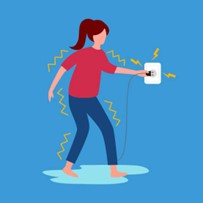
How to safely manage your appliances to avoid electrocution
Alabamart LtdElectric shock occurs when an electric current travels through the body. Many of us live in homes with electrical hazards that can be very dangerous to our health. It’s important for everyone to know how we can stay safe when dealing with these dangers at home.

Today on Alabamart's blog post, we’re going to share ways to safely manage your appliances to avoid electrocution, and save your life.
Electrical safety at home can be achieved in a number of ways, but it’s important to remember that safety doesn’t start and end with the electrical equipment – you also need to take care not to get water near anything plugged into an outlet or power cord.

Since water is an excellent electricity conductor, it can cause electric shocks or short circuits very easily. The general rule is thus to keep water in and around the home, away from any electrical appliances and any wall sockets.
- Do not use electrical appliances in the bathroom.
- Never touch electrical appliances with wet hands or bare feet.
- Never fill a kettle when it is plugged in.
- Never hold an electric appliance in one hand while touching metal objects such as taps, fridges or stoves with the other. This is because our bodies are made up of 70% of water and they thus become very good electricity conductors.
- Never use water to put out an electrical fire if the mains are not switched off. Use a dry chemical fire extinguisher instead.
- Be extremely careful when using appliances connected to power points near wet areas including sinks, baths and swimming pools.
- If an electrical appliance has been immersed in water it must be discarded immediately
- Switch off and unplug after use all portable electrical appliances, such as hairdryers, shavers, etc.
- Don’t use portable heaters in bathroom areas. Instead, you should have either a strip heater installed high on the wall or a ceiling unit installed by a registered electrical contractor.
- Don’t use extension leads or power leads in wet areas unless specifically designed to do so
- Some common household items which are prone to be exposed to water include irons, blenders, electric kettles, vacuum cleaners, dishwashers, washing machines, coffee pots (especially those without a drip tray), and microwaves.
These all pose potential risks when they are used after coming in contact with any amount of moisture.
The electrical safety precautions at home are those things that you do to prevent injury from an electric shock. This includes all the different items in your house, such as light fixtures and extension cords. It also covers appliances like clothes dryers, dishwashers, freezers, and refrigerators.

One of the most common electrical hazards in homes is damaged power cords. Particular caution should be taken with extension cords because they can easily get caught on furniture or walked over, which can lead to a short-circuit and electrical shock. Even a slightest damage extension can cause an accident. Throw it out.
If you come across a worn-out cord that could pose an electric hazard, replace it immediately!
Outlets are only meant to handle so much, and overloading them can be extremely dangerous. An overloaded outlet or power strip can generate enough heat to cause an electrical fire. Look at the label on the back of the power strip to find out how much of a load it can handle, and choose one with a trip mechanism for safety benefits. Never daisy chain two power strips together, and don’t plug an extension cord into a power strip, either. Practice these safety tips to avoid overloading your outlets.

You may think that you can get away with plugging in more than one appliance into an outlet at a time if it’s not too close to the other devices. However, this is actually dangerous for your home’s electrical system.
Overloading outlets can cause certain appliances (e.g., refrigerators) to shut off prematurely or stop working entirely due to overheating-related issues.
In every appliance manual, there is information about the proper use of the device. Almost all appliances come with a user manual, which include important information like how to use and maintain the appliances. So make sure to look at the instructions and follow them step by step to avoid potential hazards.

Most manufacturer’s instructions are for your safety first and the safety of the equipment second. Any tool or piece of equipment used improperly can be dangerous.
We are often placing ourselves in danger through our laziness or moments of thoughtlessness. A few moments of safety awareness can prevent a lot of pain:

- Do not pull a plug by the cord - Switch the switch off at the wall socket, before pulling the plug out.
- Ensure that all wall sockets have their switches in the "off" mode, when not in use.
- Never put bare wires into sockets.
- Do not stick fingers into sockets.
- Never change a light bulb without first making sure that the current is switched off.
- Do not use a fork or a knife or anything that is made of metal to remove toast from a toaster when it is plugged in.
- If you see sparks or smoke from an electrical appliance, it is telling you that something is wrong. Unplug it and call an electrician.
- Keep range hood filters free of grease build-up.
- Clean ovens and hot plates regularly to prevent the build-up of spilled fats and burnt foods.
- Install a ventilation system, flue or exhaust fan in the kitchen to expel fumes while cooking.
- Switch off and unplug your toaster before trying to remove toast, muffins or crumpets that are caught in the body of the unit.
- Never leave cooking unattended. If you must leave the room momentarily take something with you as a reminder that you are cooking (eg. a wooden spoon)
- Do not work on an electrical appliance unless you know exactly what you are doing and make sure it is not plugged in."
It is crucial to be aware of the electrical hazards in your home and electrical safety around the home and to take simple, straightforward steps to avoid them.
To avoid electrical hazards, make sure you don’t overload power outlets or leave appliances in contact with the floor. Follow your appliance’s manufacturer instructions to keep them cool and functional for many years to come.
You should always use only the best quality products that will ensure the safety of use and not damage the equipment.
We hope this article helps you safely manage your appliances to avoid electrocution. Do well to visit www.alabamart.com to find arrays of electronics and appliances at unbeatable prices. You can also reach out to us via call/whatsapp +234702500270. Contact us via email: info@alabamart.com check us out on IG: Alabamart_store.
